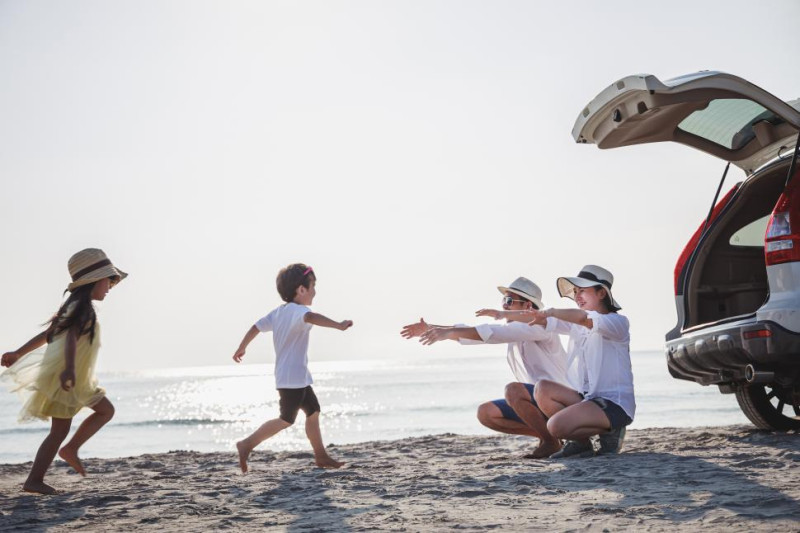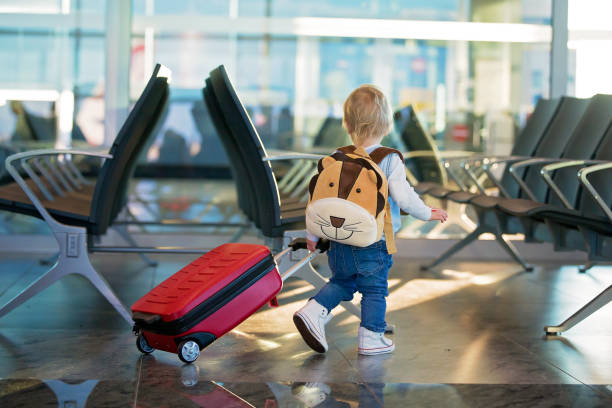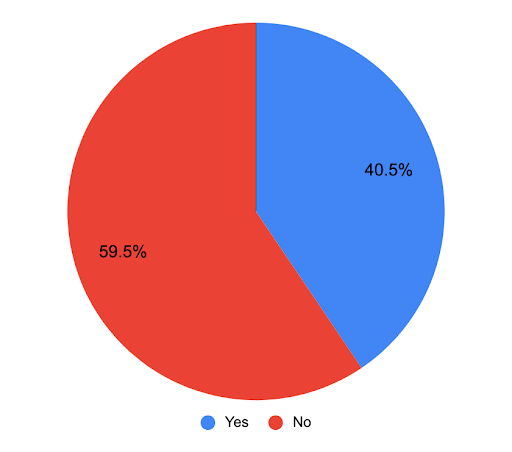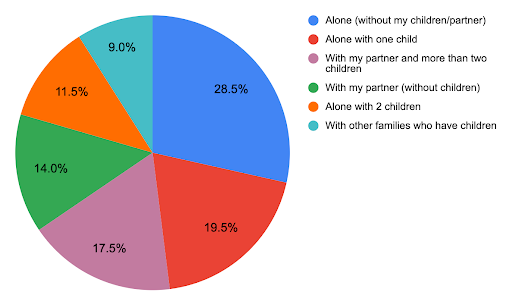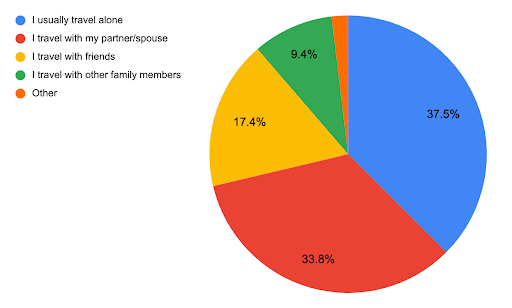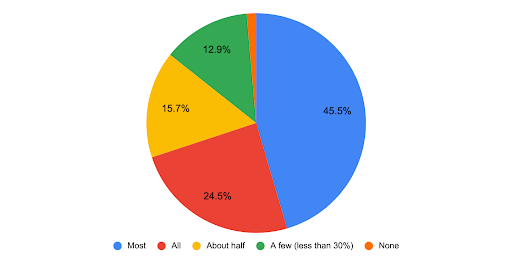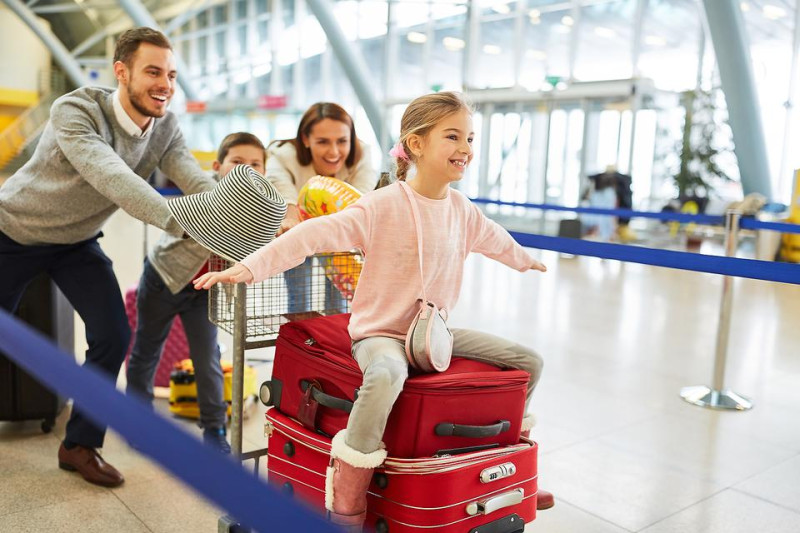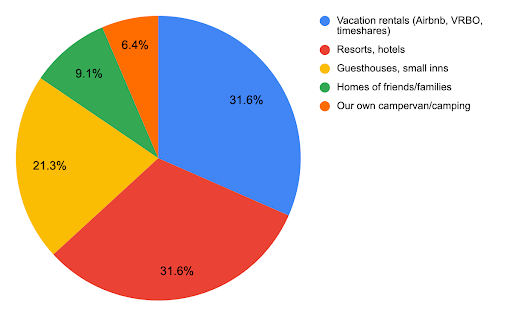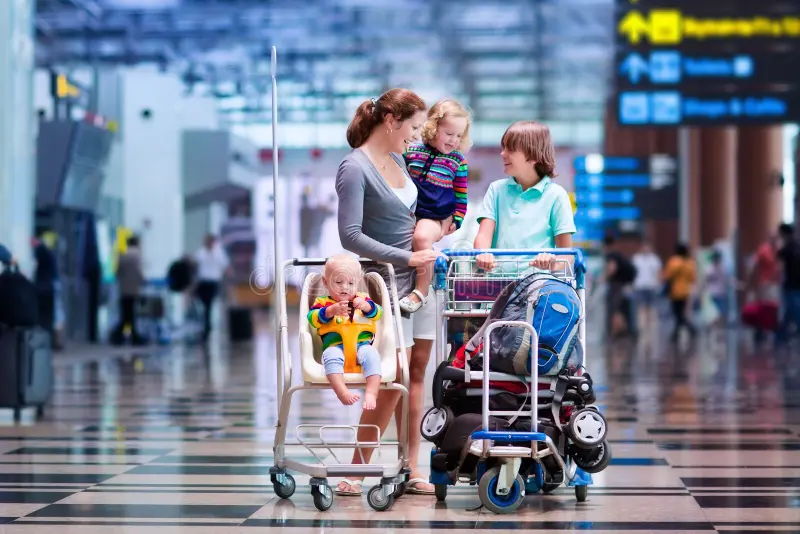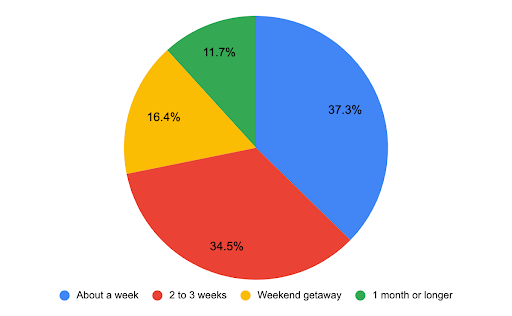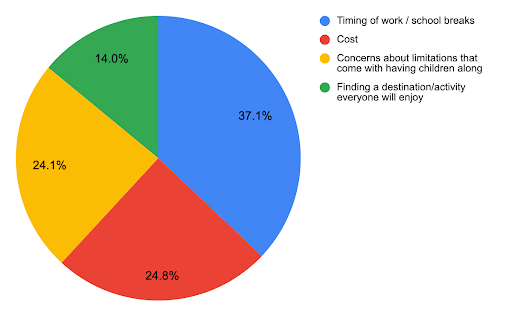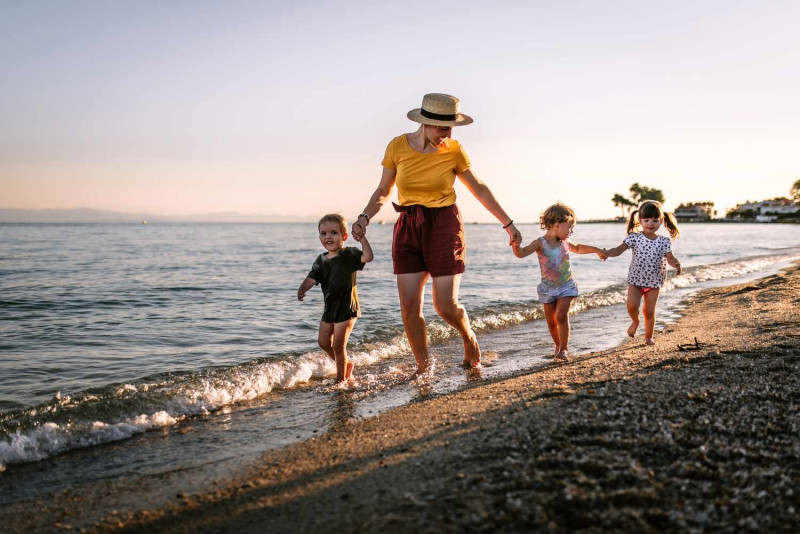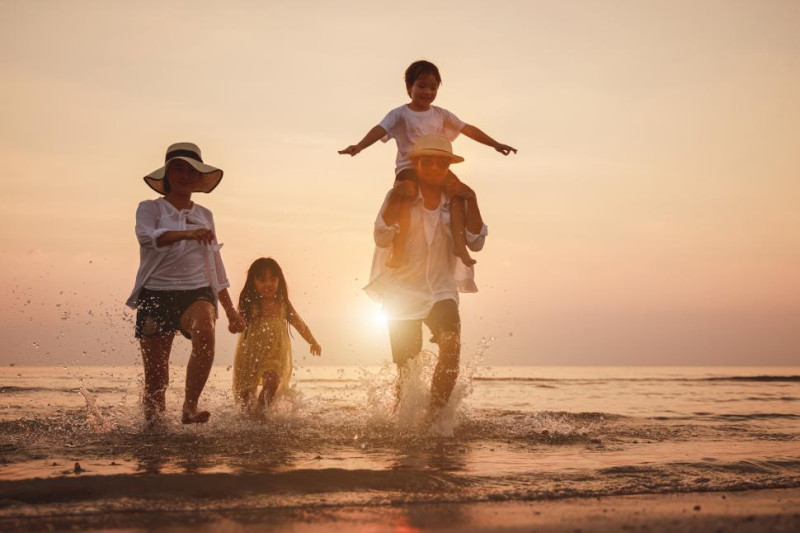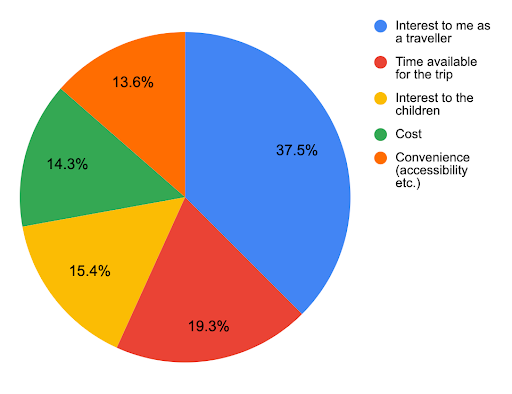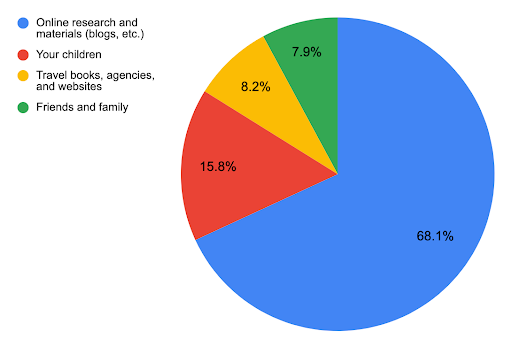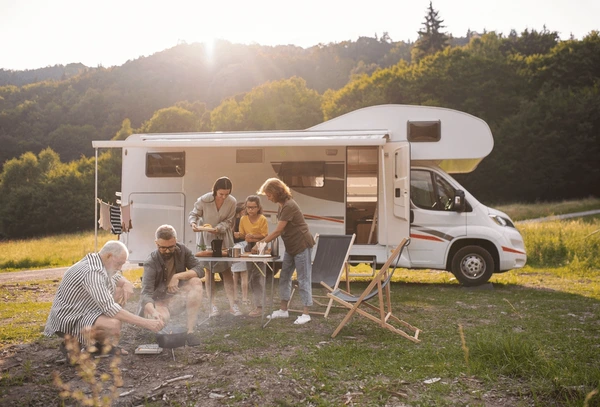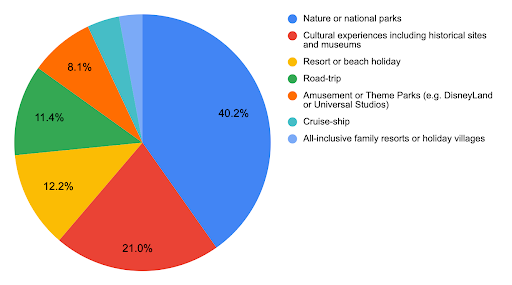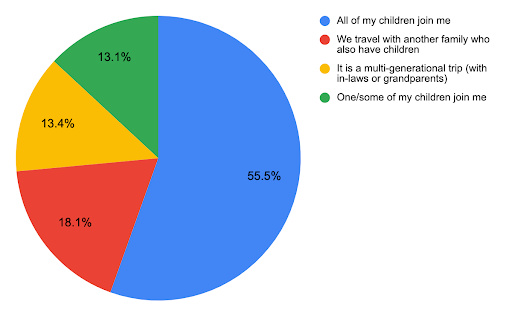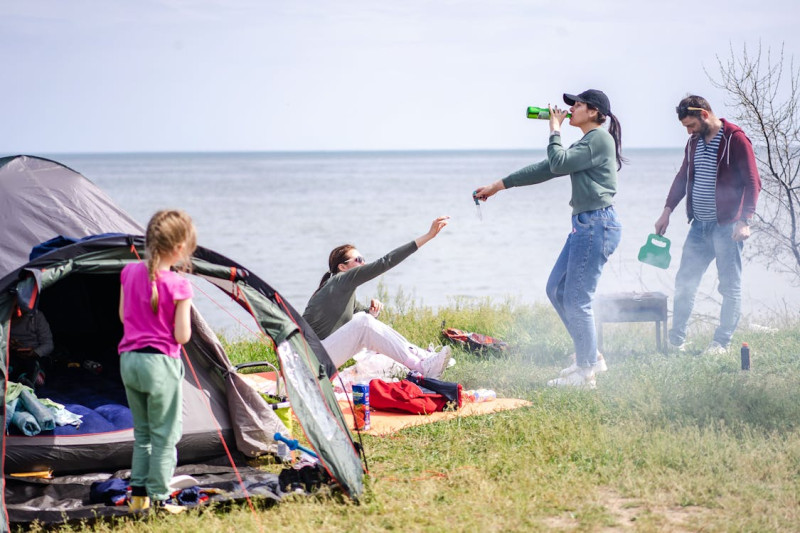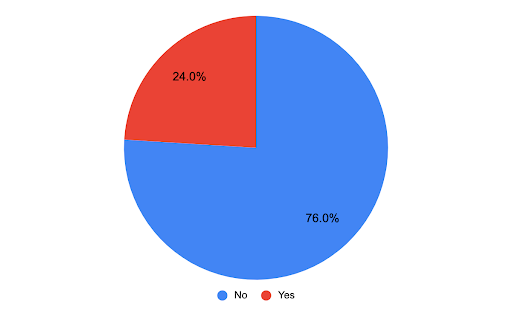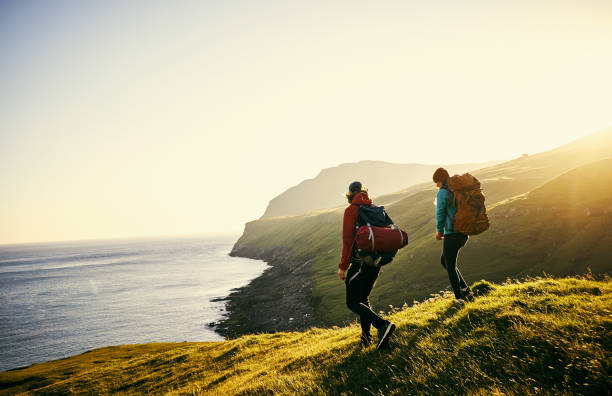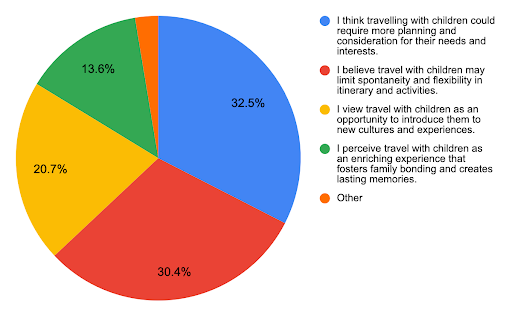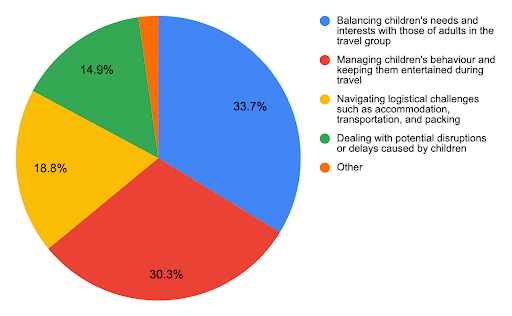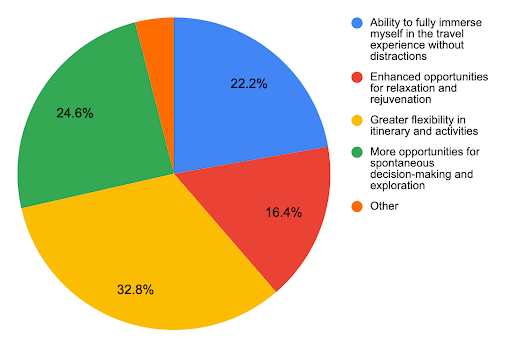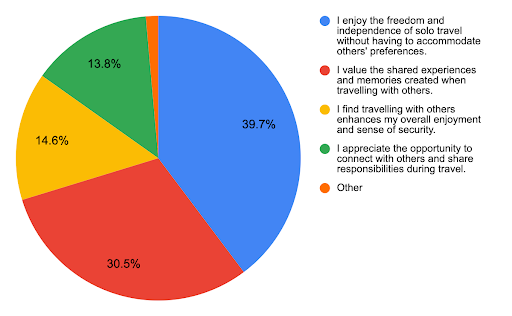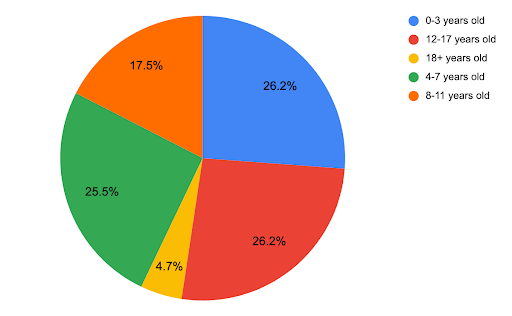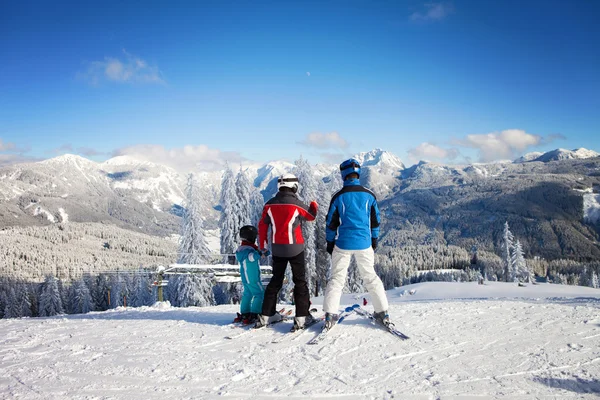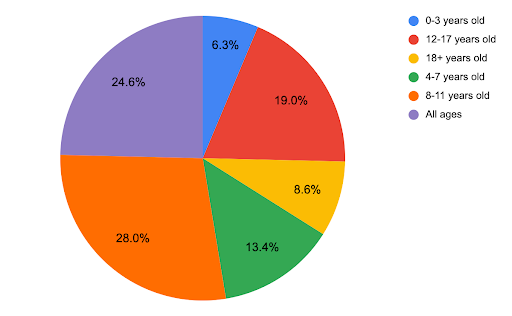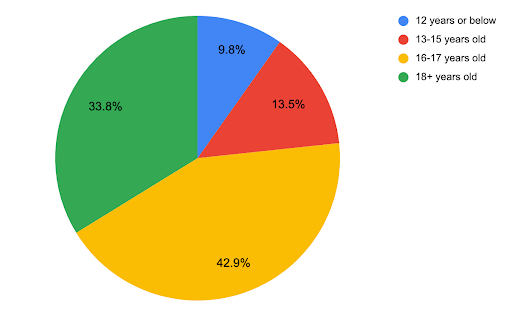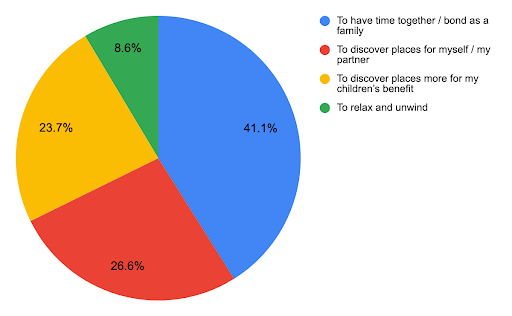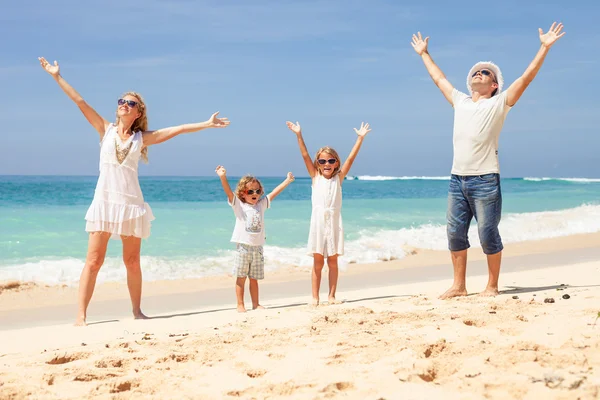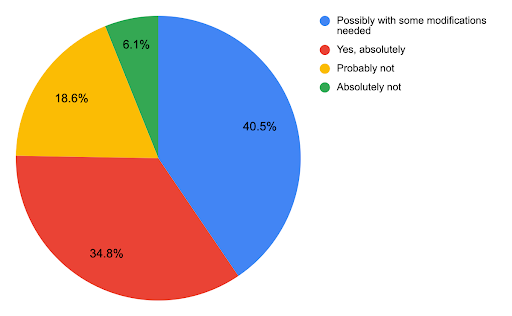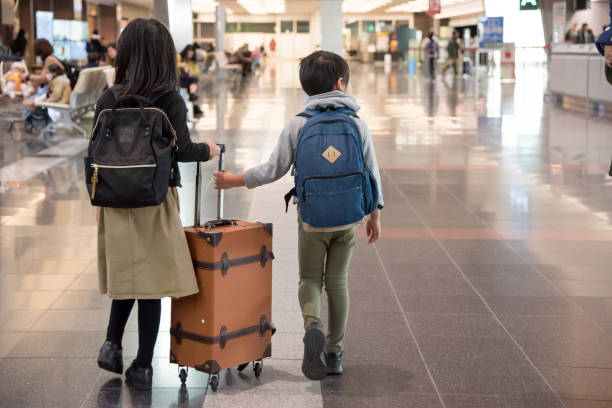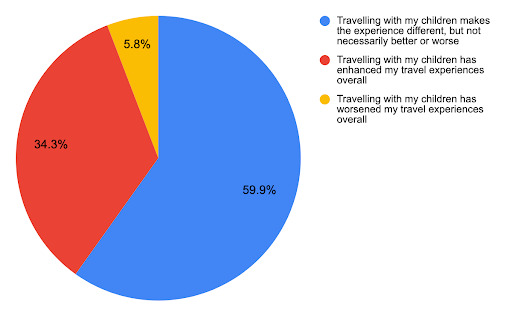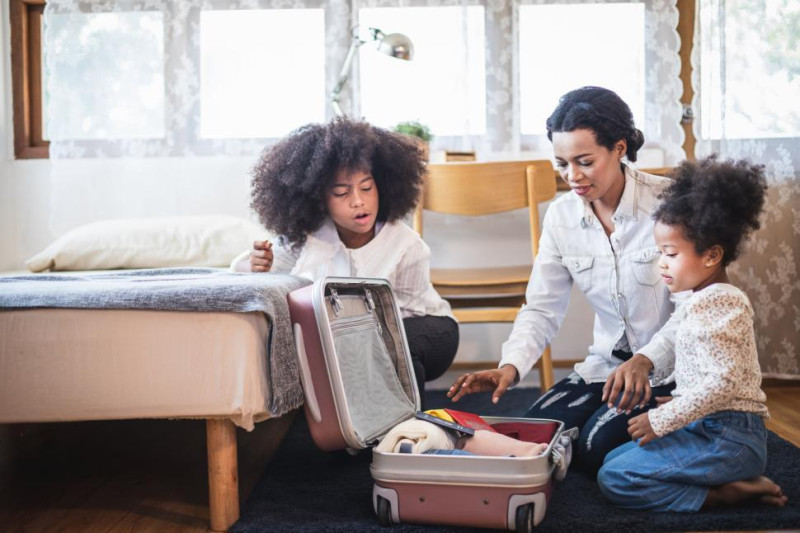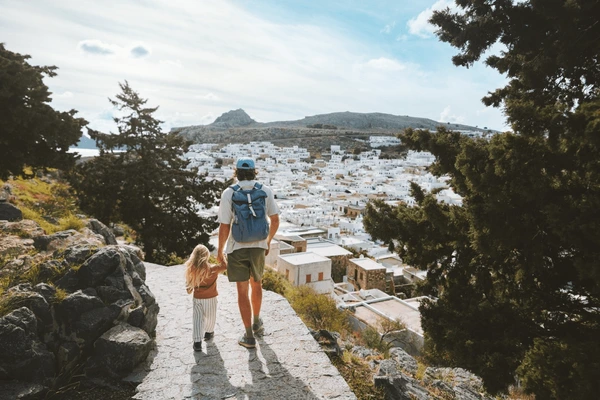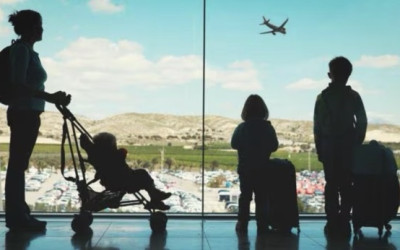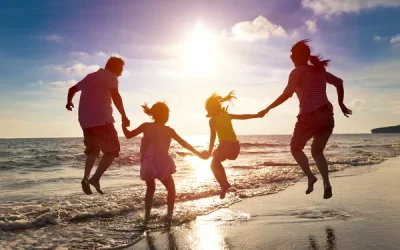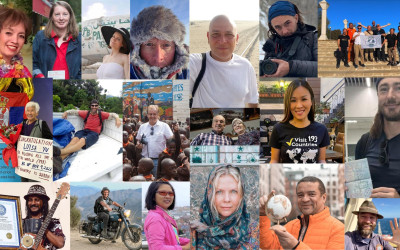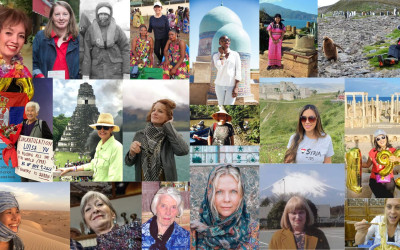Travelling with children is a unique experience for many travellers with its own joys and challenges. But what percentage of travellers choose to explore the world with their children, and what are their specific experiences and preferences? Additionally, how do travellers without children perceive family travel?
We asked and the NomadMania community answered! Our recent “Travelling with Children” survey explored the world of family travel, uncovering the insights of those who take their little ones on their adventures, as well as the perspectives of those who travel child-free. Join us as we explore the unique dynamics of travelling with children and discover what makes these family trips both challenging and rewarding, while also acknowledging the views of travellers without children.
Proportion of Members with or without Children
To better understand our community’s travel experiences, we began our survey with a simple yet crucial question: “Do you have children (minors under your care)?” This initial query helped us distinguish between those who travel with children and those who travel without, allowing us to capture a diverse range of perspectives on this subject.
A significant majority of respondents indicated they do not have children, while the remaining participants affirmed they do. The answer to this question divided which succeeding questions would be asked of our respondents.
General Travel Preferences:
Our survey revealed the interesting relationship between family dynamics and travel preferences within our community. Respondents who indicated they have children were presented with a range of choices to describe their typical travel habits, reflecting the diverse ways families navigate the travel landscape.
While the most common response, with 28.5%, was that travellers with children opted to travel solo, the majority preferred to travel with someone else, whether that was with their partner (without children), with their partner and one or more children, alone with one or more children or with other families who have children.
Meanwhile, those without children were asked to provide details about their typical travel situation, shedding light on the varied experiences of child-free travellers.
Once more, while the most common response was that child-free travellers preferred to travel solo (37.5%), the majority of respondents indicated that they preferred to travel with someone else, whether that was their partner/spouse, friends, or family members. A small number indicated that none of the provided options fit their travel situation.
Family Travel Habits and Preferences
Respondents who indicated they have children were presented with a range of choices to describe their typical travel habits, reflecting the diverse ways families navigate the travel landscape. They shared insights on the frequency of leisure/exploration trips taken with their children and their preferred trip lengths. The answers exclude business and work-related travel.
Very few travellers with children indicated that they travelled entirely without their children while an overwhelming majority travelled with them. The most common answer with 45.5% was that children were part of “most” of leisure travel. With the second most popular response specifying that their children were part of all of their travels, the survey results indicate that children joined their travelling parents a majority of the time.
One of the most important factors to consider for any traveller is arrangements for accommodation. We were curious as to what preferences parents planning to take their kids along had for accommodation.
From the selection of five options, two received the same number of affirmative responses and made nearly two-thirds of all answers. “Vacation rentals (AirBnB, VRBO, timeshares)” and “Resorts / hotels” each received 31.6% of overall responses, for a total of 63.2% of all answers. Guest houses and small inns received 21.3% of responses, while homes of friends/families and our own campervan/camping received 9.1% and 6.4% respectively.
In an open-ended question, we asked travellers with children what their top destinations for travelling with children were. With hundreds of responses, every region of the world was mentioned as a great place to travel with kids!
Some nations received an elevated number of responses as a favorite for travel with children. These notably child-friendly nations include Turkey, Spain, France, Thailand, Greece, and Japan.
Another planning-related question for travellers with children was about the length of trips they were likely to plan with their children in mind.
Responses to the question indicated that the most typical answer for travelling parents was to plan for about 1 week, followed closely a preference for 2 to 3 weeks.
This may be influenced by what factors travelling parents perceive makes travel with children difficult. When asked about these factors our travellers with children replied:
The top factor with 37.1% was selected by NomadMania’s travellers with children was the timing of work or school breaks, which limits when travel can occur, followed by financial cost at 24.8%. The cost of travelling with children was nearly evenly matched by “concerns about the limitations brought on by having children along”, 24.1%. At 14%, the final choice was “finding a destination / activity that everyone will enjoy.”
In an open-ended question, we asked parents for examples of difficulties they experienced when travelling with their children. Nearly every answer we received relayed that their greatest difficulties were related to high expenses. The most cited example was the cost of extra flight tickets. Also of notable financial burden are extra meals and accommodation for a greater number of people. Smaller numbers of respondents replied that children, particularly young children, are more fragile prone to illness and environmental factors such as heat, sunburn, or insects.
We also asked in an open-ended question, “What specific items would you take along when travelling with children which you wouldn’t if travelling without them?”
Answers to this question almost entirely featured items particular to babies and toddlers. These included baby formula or baby food, strollers, diapers, baby cots, and child safety car seats. A smaller number of respondents suggested medications or snacks, which could be necessities for children of any age. Finally, a few respondents stated that items for entertainment such as iPads / handheld gaming consoles, books, or toys were essential.
When asked “What factor influences you most when choosing destinations to which you travel with your children?”, respondents selected from five options.
The leading poll choice with 37.5% was “interest to me as a traveller”. “Time available for the trip” following at distant 19.3%. Fairly evenly split among the rest of options were “interest to the children,” “cost”, and “convenience (accessibility, etc.)” with 15.4%, 14.3%, and 13.6% respectively.
Understanding that travelling with children may have an impact on how parents research for trips, we asked, “Which source gives you the most inspiration for trips with your children?” We gave four options for consideration.
The overwhelming answer with 68.1% was, the usual suspect for gathering information, online research. A smaller number chose their children as the source of inspiration at 15.8%. The options “travel books, agencies, and websites” and “friends and family” were a much smaller portion of the final answers. They received only 8.2% and 7.9% respectively.
We further queried our parent travellers, “What type of trip have you found most enjoyable when travelling with your children?”
The leading answer by far was “nature or national parks” with 40.2%. This was followed by cultural experiences, such as historical sites or museums at 21%. Resorts or beach holidays followed at 12.2% with road trips not far behind at 11.4%. Amusement or theme parks only garnered 8.1% of selections. At the bottom of the list were cruise ship holidays and all-inclusive family resorts or holiday villages, which received 4.2% and 2.9% respectively.
Finally, we asked our travellers with children to select a statement that best fit, “On trips with my children, I’ve enjoyed it most when:”
With 55.5%, the option “I’ve enjoyed it most when All of my children join me” was by far the top preference of our parent travellers. Other options trailed distantly. The second preferred option being “I’ve enjoyed it most when we travel with another family who also have children.” The final two options were a “multi-generational trip (with in-laws or grandparents)” and “one/some of my children”. They split almost evenly at 13.4% and 13.1% respectively.
Perceptions of Travelling with Children by Child-free Travellers
Among the first questions we asked NomadMania’s childfree travellers was “Have you ever chosen a destination specifically because it was not child-friendly?”
The overwhelming response to this question, was “No”, with 76% of responses.
In an open-ended question to our childfree travellers, we inquired what were their “top destinations for travel without children.”
The single most common response to this was “Everywhere”. This answer implied that they did not perceive the presence of children to be of relevance. A few more specific responses suggested some places were probably best without children for safety reasons. Such examples included nations with recent histories of conflict such as Afghanistan or Iraq, and places with extreme environments such as the Amazon rainforest.
We asked childfree travellers how they perceived travelling with children as opposed to travelling without them.
The top two choices, as selected by our child-free respondents, showed their perception that travelling with children required greater planning in advance and could inhibit flexibility while travelling.
Additionally, we asked NomadMania’s child-free travellers about the challenges they perceived of travelling with children based on their own observations of travelling families.
The most selected choice was “balancing children’s needs and interests with those of adults in the travel group”. This polled only slightly ahead of “managing children’s behaviour and keeping them entertained.” The top two choices by our respondents indicated a strong perception that managing the needs of the children is greatest challenge.
We also asked our child-free travellers to consider what the main benefits were of travelling without children.
The two leading selections were “greater flexibility in itinerary and activities”, at 32.8% and “more opportunities for spontaneous decision-making and exploration” at 24.6%, which demonstrated a strong interest among child-free travellers in keeping plans flexible.
Probing this further, we asked the child-free travellers, “How do your travel experiences differ when you travel alone compared to when you travel with others (e.g., partner/spouse, friends, family)?”
The leading answer, “I enjoy the freedom and independence of solo travel without having to accommodate others’ preferences” was similar, with 39.7%. However, the remainder of the votes emphasised the value of sharing experiences and creating memories when travelling with others.
Polling of our community’s childfree travellers demonstrated a strong preference for flexibility when planning their travels.
Perceptions of Travelling with Children by Travellers with Kids
Investigating the perceptions of travellers who have children, one of the first questions we asked our community of travelling parents was for the current age range of their kids.
The leading two answers, “0-3 years old” and “12-17 years old” were evenly split at 26.2% each. “4-7 years old” closely followed at 25.5%. 17.5% answered “8-11 years old”, with the remainder, 4.7% indicating that their children had reached adulthood.
With this information we can better analyse the question: “Which age range do you consider best for travelling with children?”
Unsurprisingly, the smallest number of parents, 6.3%, selected “0-3 years old” as the best age range for travelling with children. Presumably, this is due to children in that age range having a greater number of needs than older children. The largest number of parents, 28%, selected “8-11 years old” as the best age range, followed by “All ages” at 24.6%. The following answer, “12-17 years old” received 19%, while “4-7 years old” received 13.4%. 8.6% chose “18+ years old”.
We further probed age-related subjects by inquiring of our travelling parents, “at what age would you be comfortable letting your children travel alone?”
At 42.6%, the highest number of respondents chose “16-17 years old”. Interestingly, “18+ years old” was the following choice with 33.8%. The age ranges of “13-15 years old” and “12 years or below” received 13.5% and 9.8% respectively. Unsurprisingly, the comfort of parents with letting their child travel without them decreased with younger age ranges.
For this question there was no definition or guidance provided as to what type of travel the children would be engaged in.
We offered parents four statements to describe their priorities when they travel with their kids:
The leading answer with 41.1% of responses was their priority was “to have time together as a family.” The following two choices were closely split. The answers “to discover places for myself / my partner” and “to discover places more for my children’s benefit” polled at 26.6% and 23.7% respectively. The smallest portion of respondents answered “to relax and unwind.”
Because so many in our NomadMania community are big travellers with huge travel aims, we asked “Do you believe that travelling with children can be combined with the aim of travelling to every country or being an extreme/big traveller?”
The most popular and uncertain answer, with 40.5% was “Possibly with some modifications needed.” This was followed by, “Yes, absolutely,” with 34.8%. “Probably not” received 18.6% of answers and “absolutely not” received 6.1%. These answers indicate that a majority of respondents believe that big travel goals are achievable in combination with travelling with children.
We asked our travellers with children about how they perceive travel with children to impact the overall experience of travelling with children through a series of statements:
The most popular answer at 59.9% was also the most neutral, “travelling with my children makes the experience different, but not necessarily better or worse.” It was followed by just over a third of respondents answering that “travelling with my children has enhanced my travel experiences overall.” Only a small number answered that travelling with their children had worsened their experiences.
In an open-ended question, we asked NomadMania’s travelling parents, “What would make travelling with your children easier for you?”
Reflecting answers to previous questions, the overwhelming response to this question was lowered costs related to flight tickets, greater luggage allowance, and more affordable accommodation options. This was followed by an indication that a greater amount of time off from work or school would enable a greater ease of travel with children.

